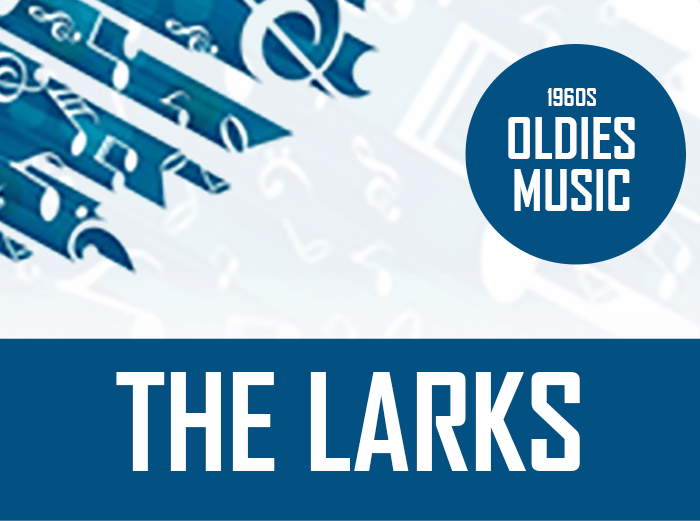Introduction to The Larks
The Larks were a North Carolina-originated R&B/soul/gospel group from the 50s music era, not to be confused with Larks (formerly The Meadowlarks) who hailed from Los Angeles and were fronted by Don Julian, or the other Philadelphia-based Larks led by Weldon McDougal. The sextet (eventually became quintet when baritone vocalist Hadie Rowe was drafted to the army) moved to New York in 1950 and recorded for different labels under various monikers and in disparate styles they offered for every label. Led by lead vocalist Eugene Mumford, he was featured on the early recordings of the group such as “When I Leave These Prison Walls” and “My Reverie.” But it was long before the Larks scored their first hit, “Eyesight to the Blind” on the R&B charts in 1951. The follow-up single was a revamp of the Smokey Hogg original “Too Many Drivers” which was also an R&B hit. Subsequent recordings met with dismal commercial failure however, and the Larks split for good in the mid-50s, with many of the members pursuing solo careers.
The Larks’ formation and early years
The African American vocal group The Larks were one of the earliest R&B acts ever formed. They originally comprised of Eugene “Gene” Mumford (tenor, b. June 24, 1925 – d. May 29, 1977), Alden “Allen” Bunn (baritone, lead guitarist, b. September 24, 1924 – d. August 2, 1977), Thermon (or Thurmon) Ruth (baritone, lead, b. March 6, 1914 – September 13, 2002), Hadie Rowe Jr. (baritone, b. 1928 – September 19, 1998), David McNeil (bass, b. 1932 – January 8, 2005) and Raymond “Peewee” Barns (tenor).
In the 1920’s, Ruth founded the Selah Jubilee Singers in New York. The choir later relocated in Raleigh, California where they had a radio show and cut a session for Decca imprint. In 1945, Ruth was trying to convince Mumford to join the Selah Jubilee Singers along with Mumford’s The Four Interns, another gospel act in North Carolina. Unfortunately, Mumford was caught in a crime, being charged with attempted rape, and was later imprisoned. However, he was found to be innocent was eventually freed. Meanwhile, Bunn who was with The Southern Harmonaires (also a gospel group) at the time, left the said group and joined Ruth’s Selah Jubilee Singers. There, Bunn did the duties of lead singer and guitarist. Not long thereafter, he and Ruth left the group and formed The Jubilators and hooked with Mumford, McNeil, Rowe and Barnes.
Recording sessions and their hit releases
The sextet traveled to New York in 1950 and recorded 17 songs (mostly gospel) for a variety of labels, using four different names: “The Jubilators” for Regal Records, “The 4 Barons for Savoy Records, “The Southern Harmonaires” for Apollo Records and “Selah Jubilee Singers” for Jubilee Records.
Bess Berman, owner of Apollo Records, signed them to her label, launching them as a secular R&B group as The Larks (for the trend back then was “bird” group names like The Ravens and The Orioles). The group had their first chart entry in 1951 with “Eyesight to The Blind” which peaked at #5 on the R&B chart. Another hit followed later that year with the song “Little Side Car,” making to the Top Ten on the R&B chart. “Little Side Car” was a remake of “Too Many Drivers,” a song by Texas country blues musician Smokey Hogg. In the midst of their career, Rowe was no longer with The Larks as he was drafted to the Army.
Life after The Larks
By 1952, most of The Larks had already parted ways: Bunn left the group and pursued a solo career and so did Barnes who would become an R&B, jazz and rock & roll session guitarist. McNeil moved to The Dominoes, replacing Bill Brown. Mumford joined the gospel act The Golden Gate Quartet but he went secular again in 1953, forming the new incarnation of The Larks. The new formation consisted of Orville Brooks, Glenn Burgess, David Bowers and Isaiah Bing. After that, Mumford became a member of other acts such as the Serenaders and Billy Ward & The Dominoes, along with former Larks McNeil. They also worked together for the vocal group The Ink Spots. Mumford died in 1977. McNeil continued performing with “The Fabulous Ink Spots” until 1989. He died in 2005.
